The Armenia-Azerbaijan Nagorno-Karabakh conflict has continued for nearly 30 years, with diplomacy failing to achieve any lasting solution. While Armenia evades political negotiations, officials in Azerbaijan say the Caspian country reserves the right to use military force if its lands remain occupied.
In a statement issued on Sunday, Azerbaijan's Defense Ministry said that the Azerbaijani army is entitled to exercise this right to liberate occupied territories in the Nagorno-Karabakh region. The ministry explained that such measures, if taken by Azerbaijan, would be devastating and destructive for Armenia compared to what took place in 2015, 2016 and 2018.
“The only language in which you need to speak with the enemy is the power of arms, with the use of which we will push the occupying forces of Armenia to leave the borders of our territories. Azerbaijani soldiers will certainly achieve this by the power of their weapon," the ministry said in the statement, which was carried by 1news.az.
The statement follows recent provocations by Armenia in the occupied territory. On May 21, the illegal separatist regime in the occupied lands held a so-called "inauguration" for the region's self-proclaimed "president". Armenia's Prime Minister Nikol Pashinyan traveled to the occupied Shusha city of Azerbaijan and attended the event on his second visit to the region in May. He also called for international recognition of the occupied region's illegitimate separatist regime.
The government of Azerbaijan described Pashinyan's visits as a threat to peace, a provocation and a violation of obligations under international law and the conflict resolution procedures by the government in Yerevan.
The conflict in Azerbaijan's Nagorno-Karabakh region is a result of Armenia's illegal claims to the historically and internationally recognized lands of Azerbaijan. Growing anti-Azerbaijan sentiments in Armenia eventually led to a bloody war in the early 1990s. Armenia's full-blown military campaign against its eastern neighbor enabled it to occupy 20 percent of Azerbaijan's sovereign territory including the Nagorno-Karabakh region and seven surrounding districts in 1991-1994. The four-year bloody war claimed the lives of 30,000 Azerbaijanis and displaced one million others.
Armenia has refused to pull its forces out of the occupied Azerbaijani lands despite International calls and four UN Security Council resolutions adopted at the height of the war in 1993. The counterproductive approach of Armenia's officials in diplomatic procedures and fatal violations of the ceasefire by the country's forces regularly trigger hostilities along the Line of Contact in the occupied territories of Azerbaijan.
The sudden midnight shelling of the civilian villages of Azerbaijan by Armenia's military in 2016 led to the most brutal military actions since the ceasefire took hold in 1994. The four-day war claimed the lives of 320 Armenian soldiers and destroyed 30 tanks and armored vehicles of various types, as well as 25 artillery complexes, according to data compiled by the Defense Ministry of Azerbaijan. The military of Azerbaijan managed to liberate 2,000 hectares (4,900 acres) of territory from Armenia's occupation, including the strategic Lalatapa and Talish high hills.
The next clashes between the Armenian and Azerbaijani armies broke out on May 20 in 2018, known as Gyunnut clashes or Operation Gyunnut. The clashes and subsequent military operations of the Azerbaijani army ended in regaining the control over several occupied villages and strategic positions within the Nakhchivan Autonomous Republic, an exclave in the southwest of Azerbaijan. By the end of May, the Nakhchivan Separate Combined Arms Army took the control back over Gyunnut, a village that has been annihilated by the Armenian forces in 1992. In addition to the village, Azerbaijan took new positions in two strategic points.







 Armenian sappers commenced on Monday mine-clearance operations in the territories adjacent to the Saint Mary Church in village of Voskepar (Armenia...
Armenian sappers commenced on Monday mine-clearance operations in the territories adjacent to the Saint Mary Church in village of Voskepar (Armenia...
 Russian Foreign Minister Sergei Lavrov has reasserted that Moscow has no intentions to stop the fighting in Ukraine, even if peace talks commence.
Russian Foreign Minister Sergei Lavrov has reasserted that Moscow has no intentions to stop the fighting in Ukraine, even if peace talks commence.
 Iran has refuted reports of alleged damage to Shimon Peres Negev Nuclear Research Centre located southeast of Dimona, Israel, during the recent air...
Iran has refuted reports of alleged damage to Shimon Peres Negev Nuclear Research Centre located southeast of Dimona, Israel, during the recent air...
 Iran’s Foreign Minister, Hossein Amir-Abdollahian, has labeled a foiled Israeli drone attack in certain parts of the country as a "failure" for Isr...
Iran’s Foreign Minister, Hossein Amir-Abdollahian, has labeled a foiled Israeli drone attack in certain parts of the country as a "failure" for Isr...



